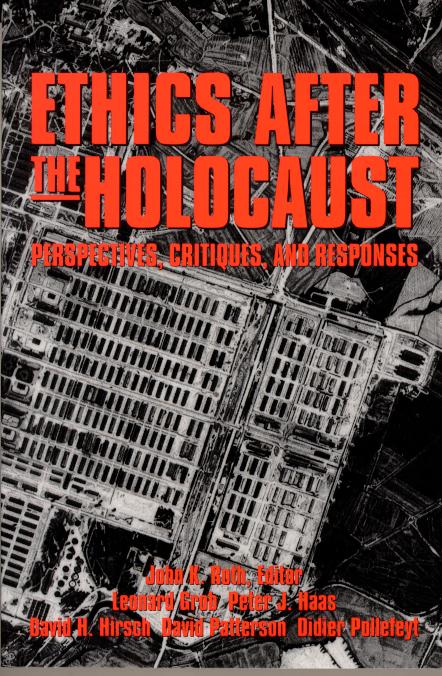“Ethics After the Holocaust: Perspectives, Critiques and Response is one of the most important books on the moral and ethical implications of the Holocaust to appear in years. Moreover, in the aftermath of Kosovo, the issues explored in this book have an urgency that transcends the book’s original subject. In reality, Ethics After the Holocaust is as much a dialogue by six original and insightful thinkers about a possible future, it is an exploration of the past the authors seek to comprehend. No one interested in the moral and ethical implications of the Holocaust and more recent attempts at mass population elimination should miss it. Highly recommended for the informed reader as well as college and university students and scholars.”
–Richard Rubenstein, noted Holocaust author
Penetrating, deep, and diverse
“Ethics After the Holocaust: Perspectives, Critiques and Response” is a penetrating book. The six major essays are serious and somber as befitting the topic. They are deep and diverse, a reflection of the keen minds and brilliant insights of the presenters Leonard Grob, Peter J. Haas, David H. Hirsch, David Patterson, Didier Pollefeyt and John K. Roth. They are made even better by the exchanges between the
scholars as five respondents reflect critically on the presentation by
one of their colleagues, and the presenter in turn is offered an opportunity to respond. The result is dialogue at its finest. From the pen of these scholars criticism is the highest form of praise, designed to clarify, to intensify the question, to deepen the response, and to manifest an excellence of critical thinking. The subject is of the utmost importance and the scholars are equal to the urgency of the task.”
–Michael Berenbaum, President Survivors of the Shoah Visual History Foundation
An unprecedented, overwhelming, and uniquely destructive event, the Holocaust makes people wonder. How could such a catastrophe happen? Why did it take place? Where were the ethical traditions and teachings that seemingly should have kept such things from occurring? Although no book can answer those questions once and for all, Ethics after the Holocaust does try to respond to those issues and especially to the third one, which promotes investigation about morality’s failures during the Holocaust and inquiry about ethics after Auschwitz as well. The book’s six contributors, Leonard Grob, Peter J. Haas, David H. Hirsch, David Patterson, Didier Pollefeyt, and John K. Roth–-experienced Holocaust scholars from the fields of literature, philosophy, religious studies, and theology–-have each written a substantive essay that sets forth fundamental concerns about post-Holocaust ethics. Then they have responded to one another, a step followed by each writer’s reply to the critiques he received. The book’s distinctive dialogue format deepens inquiry that interprets the Holocaust not only as an assault on millions of innocent human beings-–Jews first and foremost among them–-but also as an attack on goodness itself After Auschwitz, the contributors emphasize, ethics must be a way of living (thinking, feeling, doing) that cares especially for the defenseless.
After Auschwitz, the simple reaffirmation of pre-Holocaust ethics will not do anymore, because the Western religious, philosophical, and ethical traditions have shown themselves to be problematic. Far from preventing the Holocaust, they may have been seriously implicated in that catastrophe. The Holocaust shows the vulnerability of ethics–not only then but also now; not only in the Nazis’ hands but also in ours. Ethics after Auschwitz must be characterized by openness to the Other. It must not be a closed system but a way of living in openness to the vulnerability of others, especially the defenseless. Ethics after the Holocaust needs the support of politics, lest it be ineffectual. Politics also needs ethics lest it waste human life.
TABLE OF CONTENTS
Introduction
Ethics After Auschwitz
John K. Roth
Chapter One
Emmanuel Levinas and the Primacy of Ethics in Post-Holocaust Philosophy
Leonard Grob
Critiques
Response
Chapter Two
Science and the Determination of the Good
Peter Haas
Critiques
Response
Chapter Three
The Gray Zone or the Banality of Evil
David H. Hirsch
Critiques
Response
Chapter Four
Nazis, Philosophers, and the Response to the Scandal of Heidegger
David Patterson
Critiques
Response
Chapter Five
The Kafkaesque World of the Holocaust: Paradigmatic Shifts in the Ethical
Interpretation of the Nazi Genocide
Didier Pollefeyt
Critiques
Response
Chapter Six
Returning Home: Reflections on Post-Holocaust Ethics
John K. Roth
Critiques
Response
Postscript: Post-Holocaust Ethics and the Future
John K. Roth
Select Bibliography
Index
JOHN K. ROTH is the Russell K. Pitzer Professor of Philosophy at Claremont McKenna College, where he has taught since 1966. He is the author or editor of more than twenty-five books, including Approaches to Auschwitz: The Holocaust and Its Legacy (with Richard L. Rubenstein), Different Voices: Women and the Holocaust (with Carol Rittner), and Private Needs, Public Selves Talk about Religion in America. In 1998, he was named U.S. National Professor of the Year by the Council for Advancement and Support of Education (CASE) and the Carnegie Foundation for the Advancement of Teaching.
358 pp 1-55778-771-9 $18.95+ pb
Territory: World
Subject: Holocaust/Ethics
Rights: Paragon House
Rights: All Available






